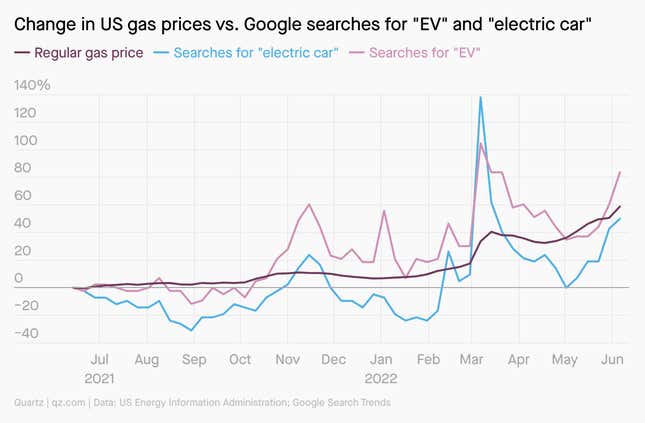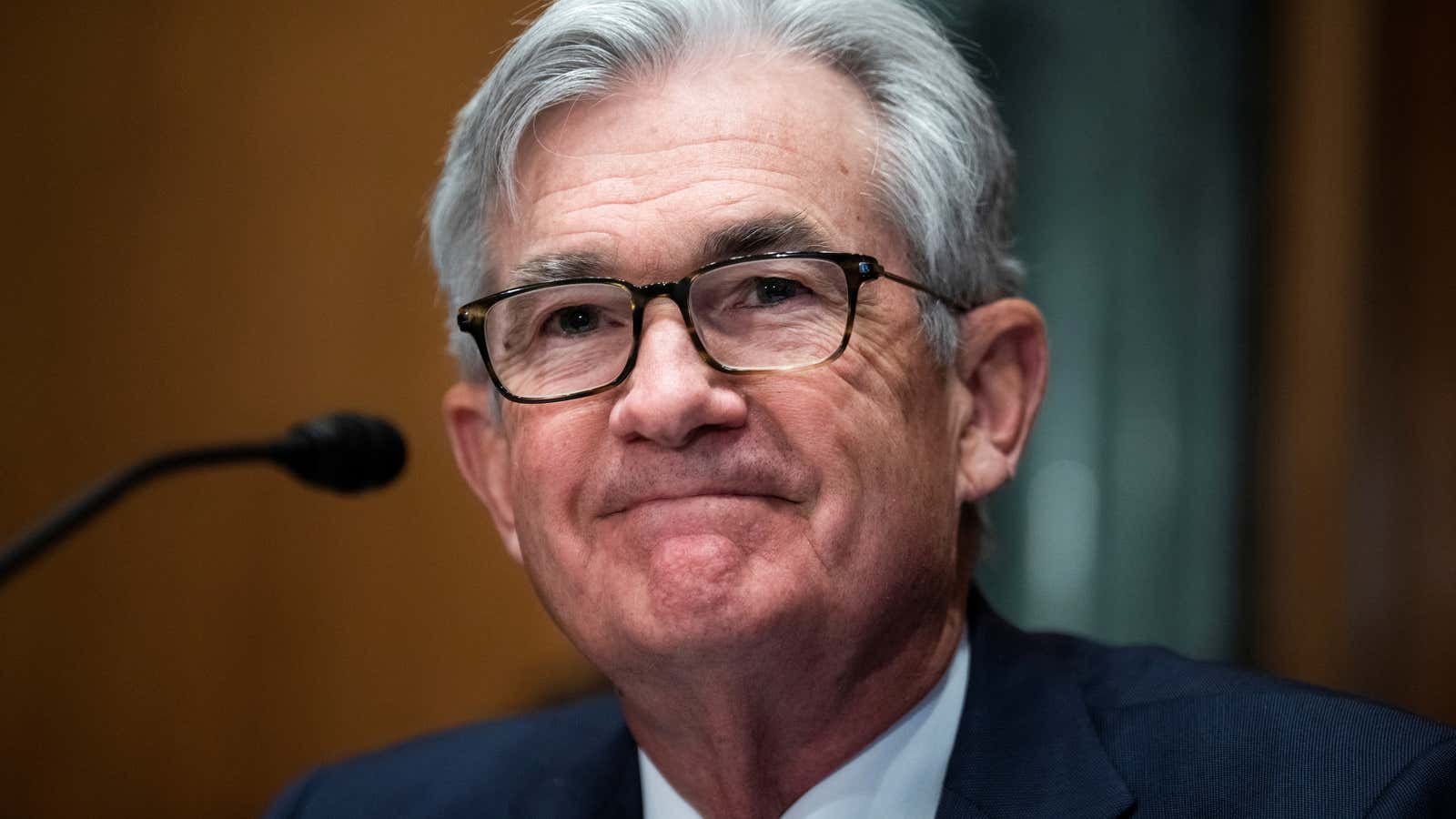Good morning, Quartz readers!
Here’s what you need to know
Wall Street entered bear territory. High inflation and recession fears took a toll on investors, with major indexes falling more than 20% from their previous highs. Some economists expect the Fed to take aggressive action to rein in inflation.
Automakers urged US Congress to lift the EV tax credit cap. GM, Ford, Stellantis, and Toyota argued the move will offset rising costs and spur consumer adoption (see more below).
JPMorgan and Goldman Sachs suspended Russian debt trading. The decision follows the US Treasury’s tightening of financial sanctions against Russia, announced last week.
US tech giants tried to appease EU regulators. Both Google and Amazon have agreed to increase competition on their platforms to avoid steep fines, according to Reuters.
A new law in Ohio allows school employees to carry guns to work. The legislation also reduces the minimum training hours from 700 to 24.
Yellowstone National Park closed for the first time in 34 years. Record floods have damaged roads, bridges, and surrounding communities, prompting evacuations.
What to watch for
It’s been a week since truck drivers in South Korea went on strike to protest working conditions and pay, and there’s no resolution in sight. The strike has forced companies such as Hyundai Motors and Korean steelmaker Posco to halt operations at some of their plants and is now threatening to hinder computer chip production.
It’s the latest supply chain disruption rocking the automobile, semiconductor, and steel industries, all of which have been trying to rebound from covid lockdowns and challenges caused by Russia’s invasion of Ukraine. The latest setback just keeps adding up:
1.6 trillion won ($1.25 billion): Cost of production and shipment disruptions from the strike so far
3,800: Cars the strike has cost Hyundai
640,000: Tires that have faced shipping issues
100: Cargo trucks the Korean government is consigning from its military to carry goods
30+: Business groups that have called for the strikers to stop
Fueling interest in EVs
Expensive gasoline is prompting drivers to give electric vehicles (EVs) a go. Gasoline prices in the US crossed the $5 per gallon threshold last week. While not the highest price ever, it’s still the highest in recent memory.
No wonder interest in alternatives to gas-guzzling engines has spiked, too. Since the start of May, US Google searches for “electric car” are up by half and searches for “EV” are up by a third.

Increased awareness in EVs may not translate into sales. Like the broader auto market, EVs have been affected by supply chain problems, including disruptions in China. EVs are also generally more expensive than fossil fuel-powered vehicles, although they tend to be cheaper to own once you factor in tax incentives and the lifetime cost of fuel and maintenance. Luckily for those who’ve googled EVs but balked at the price tag, more affordable models are set to launch next year.
A look inside Tasty, And That’s It
Russia’s new McDonald’s is Tasty, And That’s It. After the American fast food chain left Russia in response to the invasion of Ukraine, the restaurant’s former locations were reopened by its subsidiary Vkusno & Tochka, which means, “Tasty, and that’s it.”
Over the weekend, more than a dozen outlets that were previously McDonald’s locations opened under the new branding, which is a minimalistic depiction of a burger and two fries with the slogan, “The name changes, love stays.”

As Quartz reporter Michelle Cheng explains, the changes, which include blackouts of the McDonald’s logo on ketchup and sauce packets and the use of plain white soft drink cups, mark a new trend toward isolation.
Quartz’s most popular
🤨 Gas prices are so high they’re making governments suspicious
⛳️ Golfers weigh the PGA’s monopoly power against Saudi Arabia’s human rights record
😤 The real reason toxic leaders keep getting promoted
🖼 The best examples of DALL-E 2’s strange, beautiful AI art
🧐 Narendra Modi is facing cronyism allegations over a power project in Sri Lanka
🎓 Why tech majors like Google and Amazon don’t want H-1B kids to “age out”
✦ Love stories like these? Support our journalism by becoming a Quartz member. Sign up today and take 40% off.
Surprising discoveries
A kiss goodbye. Saudi Arabia, the United Arab Emirates, and other Gulf countries have banned Disney’s new film, Lightyear, over a same-sex kiss scene.
AI feel fine. A Google engineer has been put on leave after claiming that the internet giant’s new Lamda AI has developed a conscience, and its desires should be respected.
There’s nothing good on TV. In a study by Scottish and Finnish universities, monkeys were given a choice between triggering video content or audio, and they chose the latter.
Backup Ukraine. Ukrainian citizens are using their phone and an app called Polycam to preserve augmented reality models of artifacts, buildings, and other culturally significant objects.
Would we have podcasts without Apple? Almost certainly yes, but the company ushered in a new platform that helped make the medium so popular. Learn how in the latest episode of the Quartz Obsession podcast.
🎙 Listen on: Apple Podcasts | Spotify | Google | Stitcher
Our best wishes for a productive day. Send any news, comments, AI friends, and zoo tunes to hi@qz.com. Reader support makes Quartz available to all—become a member. Today’s Daily Brief was brought to you by Sofia Lotto Persio, Julia Malleck, Annalisa Merelli, and Morgan Haefner.
